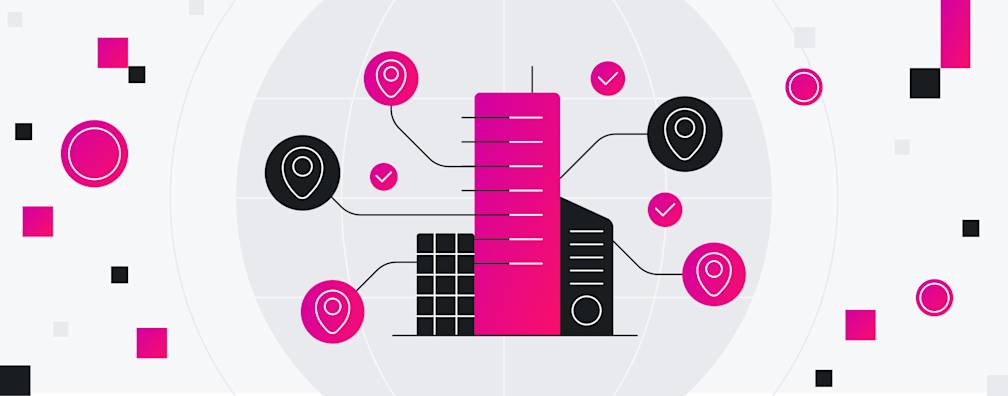Compare the best business bank accounts in Australia (2025)
- •What is a business bank account?
- •How do business bank accounts work?
- •What alternatives are there to a Business Bank Account?
- •The top 5 business bank accounts and alternatives in Australia (2025)
- •The top features to look for in business bank accounts and alternatives
- •Compare business bank accounts and alternatives in Australia
- •What's the difference between a business account and a business bank account?
- •Do I need a business account?
- •What do I need to set-up a business account?
- •Grow your business quickly with technology that does more
- •Sources
If you’re an entrepreneur, one of your top priorities is your business finances. There are lots of solutions that could fit your needs from various Australian providers. You might look at one of the “big four” banks for a solution, you might look at a non-traditional online bank, or you may not look at a bank at all.
Did you know that there are almost 100 banks operating in Australia? And there are over 800 fintechs, some of which have very competitive offerings to traditional banks. All of this is to say - there’s a lot of choice out there!
In this article, we’ll look at the differences between “business accounts” and “business bank accounts”, look at offerings from key providers, and explore how you might find the right solution for your needs.
What is a business bank account?
A business bank account is a type of account specifically designed for companies to manage their financial transactions. It allows businesses to deposit and withdraw money, pay bills, and receive payments from customers. Having a separate business account helps keep personal and business finances distinct, making it easier to track expenses, manage cash flow, and handle taxes.
Accenture found that between 2019 and 2023, banking interactions grew by 37%, indicating increasing digital interaction as businesses look for banks to manage their finances. This is why it is critical to find a business bank that suits your needs.
How do business bank accounts work?
Business bank accounts function similarly to personal ones but are designed for companies. They allow businesses to manage their finances, make transactions, and often come with features like invoicing tools and multiple user access. They also help keep business and personal funds separate, which is crucial for accounting and tax purposes.
What alternatives are there to a Business Bank Account?
The growth of non-bank financial services providers such as challenger banks and fintechs has opened up new possibilities for businesses beyond traditional bank accounts.
Online-only business bank accounts: Operate entirely online, making them a good option if you prefer managing your money online. They usually have lower fees and are easy to use but they lack physical branches and may not offer some traditional banking services.
Payment services: Services like PayPal or Stripe allow you to accept payments without a traditional bank account which are easy to set up and provide quick access to funds. The downside is that they charge fees per transaction, which can add up fast if your business has a lot of transactions.
All-in-one business accounts: Non-bank providers such as Airwallex offer all-in-one business accounts that help businesses grow and operate globally with multi-currency accounts, high speed international transfers, borderless cards, expense management, and online payments.
The top 5 business bank accounts and alternatives in Australia (2025)
Australian businesses have often looked to our largest banks - otherwise known as the “big four” - for their financial solutions. We’ve rounded up the top business accounts from these providers, for you to get a general feel of what’s available. We’ve also included our Airwallex Business Account in this list, so you can get an idea of what a leading non-bank provider can offer.
ANZ Bank Business Extra Account: Established in 1828, ANZ is the largest banking group in the region. It provides banking and financial products to over 8.5 million business and retail customers in markets around the world.
Commonwealth Bank Business Transaction Account: CommBank has the largest customer base of the big four, and is often recognised for their simple digital banking app.
National Australia Bank Business Everyday Account: Similar to ANZ, NAB’s customers are mainly retail businesses and are offered a range of digital banking products to allow customers to easily track, send and receive payments.
Westpac Bank Business One Low Plan: As the oldest bank in Australia, Westpac is popular for the trust they have built with customers and popular for its competitive interest rates with large balances.
Airwallex Business Account: Airwallex is a fintech, not a bank. The Business Account offers an end-to-end financial solution with built-in expense management, multicurrency accounts, borderless cards and various software integrations.
The top features to look for in business bank accounts and alternatives
It can feel overwhelming when you start comparing business bank accounts, especially if you’re a small growing business. To help, we’ve compiled a list of the most important features to look out for:
Fees
Yet again - the first thing to look at is fees! Every business should have low or no monthly fees. When cash flow is tight, every dollar counts, and so this flexibility will enable your business to continue to use capital where it's needed most. Also you should seek low or no transfer and foreign exchange fees because those can add up!
Speed to implement
Starting out with a business account can be daunting so it is important that you find one that is easy to implement and integrates well with your existing softwares. It may be worth paying a little bit more for one centralised product or service, rather than several smaller fees for many. This could help you save money overall, and will also likely save you precious time - while avoiding frustrating tasks like manual data transfer.
Scalability
It's also critical to find a small business account that will grow with you. As your business grows, so do your payment needs and their complexity.
By opening a small business account that has features like international payments, online payment processing and card creation from day one, you save yourself countless hours of having to switch in a year or two when you've outgrown your current provider. Look for an end-to-end financial solution which includes payment acceptance, expense management, multi-currency cards and API integrations.
Products and services designed for growing businesses
Different providers may have valuable products or services which can help you boost efficiencies or streamline your capital.
For example, Airwallex offers a powerful alternative to the traditional business saver offered by the big banks; Yield. Yield gives you the opportunity to earn competitive returns on your multi-currency balances - with no minimum lock-up period required.
Visibility and transparency
When you’re running a small business – or any business – money is moving everywhere. Supplier and vendor payments, subscriptions, customer transactions, bills, employee expenses… The list goes on.
As we mentioned before, you know that every dollar is critical. Founders should keep an eagle eye over their money movements, so a birds-eye, real-time view of money movement is absolutely essential.
Open a business account in minutes.
Compare business bank accounts and alternatives in Australia
ANZ Bank Business Extra Account | Commonwealth Bank Business Transaction Account | National Australia Bank Business Everyday Account | Westpac Bank Business One Low Plan | Airwallex Business Account | |
|---|---|---|---|---|---|
Monthly Fees | $10 | $0-$10 | $10 | $10 | $0-29
|
International transfer fees | 3%
| 3.5%
| 3.5%
| 3%
| 0% |
Additional fees | 80c assisted transaction fee. $5 international ATM fee.1 | $3 assisted transaction fee. $15 overdraft fee. $5 + 3% international ATM fee2 | $2.50 assisted transaction fee.3 | $1 in-branch deposits or withdrawals. $5 + foreign surcharge for international ATM fee. $15 overdraft fee.4 | None |
Multi currency account | ❌
| ❌
| ❌
| ❌
| ✅ |
Payment acceptance | ✅ | ✅ | ✅ | ✅ | ✅ |
Expense management | ❌
| ❌
| ❌
| ❌
| ✅ |
Interest savings or returns | ❌
| ❌
| ❌
| ❌
| ✅Earn returns of 3.93% on AUD or 3.94% on USD* |
ANZ Bank Business Extra Account
The ANZ Business Extra Account is designed for businesses with frequent banking needs. It offers unlimited ANZ transactions, bulk payment functionality, and integrations with accounting software.
Pros:
Unlimited ANZ ATM and domestic electronic transactions at no extra cost
Free ANZ Business Visa Debit card included
Overdraft facility available
Cons:
High overseas transaction fees of 3%
High overseas withdrawal fees of $5
No multi-currency accounts, payment acceptance features, or opportunity to earn returns included
Commonwealth Bank Business Transaction Account
The Commonwealth Bank Business Transaction Account offers flexible fees and a set number of free transactions per month, with convenient access to CommBiz, NetBank, and the CommBank app. This account may be suited for businesses seeking daily transaction management.
Pros:
Free monthly account when choosing the digital-only option
Unlimited free domestic electronic transactions
MYOB and Xero integrations
Cons:
High rates of physical transactions, including $5 fee per assisted transaction and withdrawal fees of $5
High overseas transactions fees of 3%
No multi-currency accounts, payment acceptance features, or opportunity to earn returns included
National Australia Bank Business Everyday Account
The NAB Business Everyday Account is suitable for day-to-day business operations, with integration options and support services. It comes with a linked debit card and offers in-branch or online banking.
Pros:
No monthly account fee
Free NAB ATM and EFTPOS transactions
Advanced fraud protection measures
Cons:
Branch transactions incur a $2.50 fee
No multi-currency accounts, payment acceptance features, or opportunity to earn returns included
No expense management features. An additional platform will likely be required
Westpac Bank Business One Low Plan
The Westpac Business One Low Plan provides banking services catering to businesses with lower transaction volumes. It simplifies financial management with payment support and online banking access.
Pros:
Online banking features
25 free transactions per month
Customisable alerts for low balances and inbound and outbound payments
Cons:
Each transaction over the free allowance comes with a 50c fee
High international transaction rates, including currency conversion and transfer
No multi-currency accounts, payment acceptance features, or interest savings on returns included in this account
Airwallex Business Account
The Airwallex Business Account is a fee-friendly option for international transactions, offering multi-currency management and high-rate savers on AUD and USD funds. It features real-time spend tracking, expense management, and seamless integration with Xero, MYOB, QuickBooks, and many more.
Pros:
Free domestic and international transfers
Hold, convert, and transfer international funds with a multi-currency account
Corporate cards and expense management tools to manage spend for every employee
Cons:
No physical branches – digital-only platform and service
New updates and optimisations being released regularly, which may not suit the user habits of all consumers
Built to serve businesses only, no complementary consumer account available
What's the difference between a business account and a business bank account?
The difference between a business account and a business bank account is that the latter is provided by a financial institution that holds a banking licence, commonly known as banks.
A business account generally refers to an account and financial solution provided by a financial institution that does not hold a banking licence but does hold other regulated licences.
Many modern fintechs, like Airwallex or Wise, have opted not to become a bank. Airwallex is able to build a business account service that covers payment collection, treasury, transfers and payouts, invoicing, expense management and cards.
Do I need a business account?
In Australia, almost all registered businesses, from small startups to large corporations, choose to open business bank accounts - or a specialised business account from a non-bank financial provider - to manage their finances.
For many businesses, it’s also a legal requirement. If your business is registered as a company, partnership or trust in Australia, you are required to open a business account or business bank account for tax purposes.
Sole traders and freelancers, on the other hand, might opt not to open a business bank account if their business transactions are minimal or closely tied to personal finances. Even so, many of them will find that a business account or business bank account is a valuable way to simplify tax reporting and separate their personal and business finances for better financial clarity.
Read more information here on: Do I need a business bank account?
What do I need to set-up a business account?
For Australian business owners, setting up a business bank account or business account is straightforward but may vary slightly depending on the provider you choose. You'll generally need to provide your business registration details and information about your business structure and industry to help the provider match you with the best account type.
The documentation and details you’ll be asked for may include:
Business name;
Primary business address;
Australian Business Number (ABN);
Australian Company Number (ACN);
Industry type; and
Identification for all owners or partners.
In most cases, government-issued photo IDs like a passport or driving licence will be accepted, or a combination of other documents that show your identity and address together.
The application process is generally quick once you’ve submitted all the relevant documents and information. However, verification checks can extend the time taken to open your account and you might be asked to give more information or paperwork to support your application.
Non-bank providers (and many banks) will allow you to apply to open a business account online through a fully digital account application process where you upload and submit the required documentation before being verified.
Read more information here on: How to open a business bank account
Grow your business quickly with technology that does more
In today's fast-paced business environment, managing your finances efficiently is crucial for growth. With a plethora of options available, from traditional banks to innovative fintech solutions, choosing the right business bank account can make all the difference.
Traditional banks like ANZ, Commonwealth Bank, National Australia Bank, and Westpac offer reliable services but often come with higher fees and limited features. In contrast, fintech companies like Airwallex provide comprehensive, all-in-one business accounts that are designed to help businesses grow and operate globally with ease.
Why Choose Airwallex?
Airwallex offers a range of features that make it an attractive choice for businesses looking to expand:
Low Fees: With a monthly fee of $29 (waived if you deposit at least $5k per month or hold a minimum balance of $10k) and no transaction fees, Airwallex ensures your capital is used where it's needed most!
Multi-Currency Accounts: Create individual foreign currency accounts for 23+ currencies, allowing you to send, hold, and receive international currencies, avoiding double conversions.
Global FX and International Payments: Make money transfers to over 150 countries at interbank rates with a competitive 0.5-1% FX fee.
Virtual and Physical Debit Cards: Create multiple virtual debit cards instantly and order physical debit cards for your team without visiting a branch.
Expense Management: Streamline your expense management with an accurate, zero-touch experience that eliminates repetitive work and clunky software.
High-Impact Integrations: Airwallex syncs seamlessly with leading accounting software like Xero, making reconciliation a breeze.
Don't let traditional banking hold you back. Open a business account with Airwallex in minutes and experience the difference that technology can make for your business.
Open a business account in minutes.
Sources
1. https://www.anz.com.au/business/accounts/transaction-accounts/business-extra/
2. https://www.commbank.com.au/business/bank-accounts/business-transaction-account.html
3. https://www.nab.com.au/business/business-bank-accounts/transaction-accounts/no-monthly-fee-business-account
4. https://www.westpac.com.au/business-banking/bank-accounts/
Disclaimer: The information in this article is based on our own online research. Airwallex was not able to manually test each tool or provider. The information is provided for educational purposes only and a reader should consider the specific requirements of their business when evaluating providers. This research is reviewed annually. If you would like to request an update, feel free to contact us at [[email protected]]. This information doesn’t take into account your objectives, financial situation, or needs. If you are a customer of Airwallex Pty Ltd (AFSL No. 487221) it is important for you to read the Product Disclosure Statement (PDS) for the Direct Services, which is available here.
The Airwallex Yield Liquidity Fund (Yield) is issued by K2 Asset Management Limited (K2) (ABN 95 085 445 094, AFSL No 244393), a wholly owned subsidiary of K2 Asset Management Holdings Limited. This information doesn’t take into account your objectives, financial situation, or needs. Read the Product Disclosure Statement (PDS) and Financial Services Guide (FSG) for Yield, available at www.airwallex.com.au/terms from Airwallex Capital Pty Ltd (ABN 37 609 653 312, AFSL No. 549026). All investments carry risk. *Target returns are net of fees as at 1 April 2025 (AEDT) and indicate past 1-day annualised returns of the relevant underlying JPMorgan Liquidity Funds.
Share

Vanessa is a business finance writer for Airwallex. With experience working at leading B2B technology companies, Vanessa is passionate about helping Aussie businesses, large and small, grow through cutting-edge tech. In her day-to-day, she breaks down complex tech jargon to help businesses streamline their end-to-end financial operations.
View this article in another region:Canada - EnglishCanada - undefinedChinaHong Kong SAR - EnglishHong Kong SAR - 繁體中文New ZealandSingaporeUnited KingdomUnited States
Related Posts

WorldRemit Account Review (2025): Features and fees
•4 minutes

ERP integration: everything a business needs to know
•8 minutes